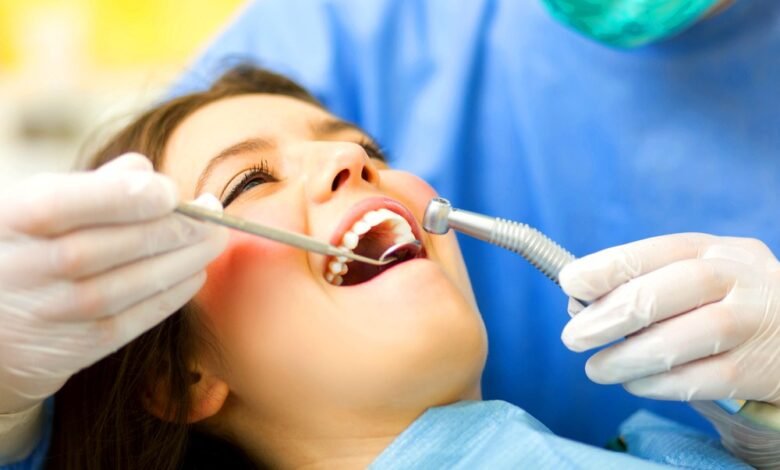Oral Health Matters: The Importance of Dentistry in Overall Well-being

Imagine a world without smiles, where people suffer from dental problems and oral discomfort. It’s not a pleasant thought, is it? Oral health plays a vital role in our overall well-being, impacting our physical and emotional health. The field of dentistry focuses on maintaining oral hygiene, preventing dental diseases, and promoting healthy smiles. In this article, we will explore the importance of dentistry in maintaining dental health and how it affects our overall well-being.
Read More: Oral Health Tips: Maintaining a Healthy Smile 2023
The Link Between Oral Health and Overall Well-being
Oral health is not just about having a bright smile; it goes much deeper than that. Our mouth is the gateway to our body, and the state of our dental health can significantly impact our overall well-being. Poor oral hygiene can lead to various dental issues such as cavities, gum diseases, and tooth loss. Moreover, research has shown a strong association between dental health and systemic diseases like heart disease, diabetes, and respiratory infections. Taking care of our oral health is essential for maintaining a healthy body.
The Role of Dentistry in Preventive Care
Prevention is the cornerstone of dentistry. Regular dental check-ups and cleanings are crucial for maintaining optimal oral health. Dentists and dental hygienists perform thorough examinations, identify early signs of dental problems, and provide personalized oral hygiene instructions. They also administer preventive treatments like dental sealants and fluoride applications, which protect teeth from decay. By focusing on prevention, dentistry aims to reduce the occurrence of dental issues and promote long-term oral health.
Restorative Dentistry: Repairing Damaged Teeth
Despite our best efforts, dental problems can still arise. Restorative dentistry comes to the rescue when teeth are damaged or decayed. Dental fillings, crowns, and bridges are common restorative procedures that repair and restore the functionality of teeth. These treatments not only improve oral health but also enhance the appearance of the smile, boosting self-confidence.
Cosmetic Dentistry: Enhancing Your Smile
A beautiful smile can have a profound impact on one’s self-esteem and social interactions. Cosmetic dentistry focuses on improving the aesthetics of the smile. Procedures like teeth whitening, veneers, and dental implants are performed to create a more pleasing appearance. Cosmetic dentistry not only enhances the visual appeal of teeth but also promotes emotional well-being.
Orthodontics: Aligning Teeth for Better Functionality
Crooked or misaligned teeth can pose oral health issues and affect the proper functioning of the mouth. Orthodontics specializes in aligning teeth and jaws, correcting bite problems, and improving overall dental health. Braces, aligners, and other orthodontic appliances help achieve straighter teeth, facilitating better oral hygiene practices and enabling efficient chewing and speaking.
Periodontics: Caring for Your Gums
Healthy gums are the foundation of a healthy smile. Periodontics focuses on preventing, diagnosing, and treating gum diseases. Periodontists perform deep cleanings, root planing, and scaling procedures to remove plaque and tartar buildup from the gum line. By maintaining healthy gums, periodontics helps prevent tooth loss and preserves the integrity of the supporting structures of the teeth.
Oral Surgery: Addressing Complex Dental Issues
Certain dental conditions may require surgical intervention. Oral surgery encompasses procedures such as tooth extraction, dental implant placement, and corrective jaw surgery. Oral surgeons possess the expertise to address complex dental issues and restore oral health. These procedures can alleviate pain, correct functional problems, and improve overall well-being.
Sedation Dentistry: Overcoming Dental Anxiety
Dental anxiety is a common obstacle that prevents individuals from seeking necessary dental care. Sedation dentistry offers a solution for those who experience fear or anxiety during dental procedures. Through the use of sedatives, patients can relax and undergo necessary treatments without distress. Sedation dentistry ensures that oral health is accessible to everyone, promoting overall well-being.
Pediatric Dentistry: Ensuring Healthy Smiles for Children
Children require specialized dental care to establish good oral health habits from an early age. Pediatric dentists are experts in providing comprehensive dental care for infants, children, and adolescents. They create a positive and friendly environment, making dental visits enjoyable and stress-free. By focusing on prevention and education, pediatric dentistry plays a crucial role in ensuring healthy smiles for children.
Geriatric Dentistry: Promoting Oral Health in Older Adults
As we age, our oral health needs change. Geriatric dentistry caters to the unique dental concerns of older adults. Issues like dry mouth, tooth loss, and gum diseases are prevalent among the elderly. Geriatric dentists offer specialized care to address these challenges, promoting dental health and overall well-being in older individuals.
The Connection Between Oral Health and Systemic Diseases
Oral health is intricately linked to our overall health. Research has revealed associations between poor dental health and systemic diseases like cardiovascular disease, diabetes, and respiratory infections. Bacteria from oral infections can enter the bloodstream, triggering inflammation and contributing to the development of various health conditions. Maintaining good oral hygiene and seeking regular dental care are essential for reducing the risk of systemic diseases.
The Impact of Oral Health on Mental and Emotional Well-being
A healthy smile can have a profound impact on our mental and emotional well-being. Dental problems can cause embarrassment, low self-esteem, and social anxiety. Conversely, a beautiful smile boosts confidence and improves the quality of life. Taking care of our oral health not only benefits our physical well-being but also positively influences our mental and emotional state.
Oral Health Tips for Maintaining a Healthy Smile
- Brush your teeth at least twice a day using fluoride toothpaste.
- Floss daily to remove plaque and food particles from between your teeth.
- Limit sugary and acidic foods and drinks, as they can contribute to tooth decay.
- Avoid tobacco products, as they increase the risk of gum disease and oral cancer.
- Stay hydrated to promote saliva production, which helps prevent dry mouth.
- Use a mouthwash to freshen your breath and kill bacteria.
- Replace your toothbrush every three to four months or sooner if the bristles are frayed.
- Visit your dentist regularly for check-ups and professional cleanings.
The Importance of Regular Dental Check-ups
Regular dental check-ups are crucial for maintaining optimal dental health. During these visits, dentists perform comprehensive examinations, spot early signs of dental problems, and provide professional cleanings. They can address any concerns or questions you may have and offer personalized advice on maintaining good oral hygiene. By prioritizing regular dental check-ups, you can prevent dental issues and ensure a healthy smile.
Read More: If You Can’t Fast Dental Care 3 Ways Treat Toothache
Conclusion
Oral health is an integral part of our overall well-being. Dentistry plays a vital role in preserving and improving oral health, ultimately impacting our physical, mental, and emotional well-being. From preventive care to restorative treatments, and cosmetic enhancements to orthodontics, dentistry offers a wide range of services to maintain healthy smiles and promote overall wellness. By prioritizing dental health and seeking regular dental care, we can ensure a lifetime of healthy smiles and an improved quality of life.
FAQs
Why is oral health important for overall well-being?
Good oral health contributes to better systemic health and psychological well-being. Neglecting oral health can lead to dental problems and increase the risk of systemic diseases.
How often should I visit the dentist?
It is recommended to visit the dentist every six months for routine check-ups and cleanings. However, the frequency may vary based on individual oral health needs.
Can poor oral health affect my heart health?
Yes, poor oral health, especially gum disease, has been linked to an increased risk of cardiovascular disease and other systemic conditions.
What can I do to improve my oral health?
Practicing proper oral hygiene, eating a balanced diet, avoiding tobacco and excessive alcohol consumption, and scheduling regular dental check-ups are essential for maintaining good oral health.
Can dentistry help improve my smile?
Yes, dentistry offers various cosmetic treatments like teeth whitening, veneers, and orthodontic procedures that can enhance the appearance of your smile and boost your self-confidence.







